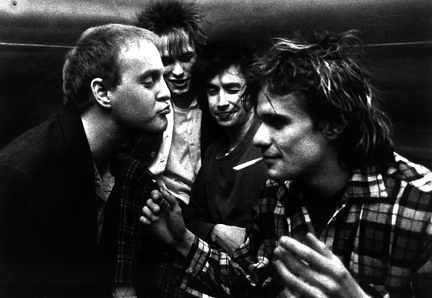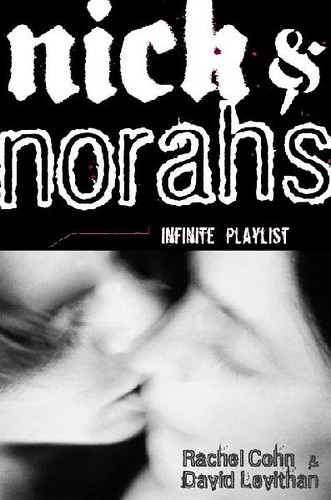 Last week
Last week, I talked at length about David Carr's memoir,
The Night of the Gun. I was still about 100 pages away from finishing, but the remaining chapters lived up to my expectations. The book is a jarring, frightening and at times disgusting look at the dark side of addiction. If the final chapters added anything of note, it was my realization that while Carr seemed at least intellectually aware of his plight as a recovering addict, there still seemed to be a strong disconnect between the man he now is and "That Guy," as he referred to his time as a junkie. There's a big reveal toward the end that crystallized this for me, and while I still found the book to be enormously compelling -- and well worth the read -- I can't say I was totally convinced Carr had really come to terms with his past. Then again, who has?

Since then, I continued my brief sabbatical from crime fiction with
All Over But the Shouting, an oral history of legendary 80s rock band The Replacements. Now, I'm a huge music nerd, as Zombie can probably attest. The 'Mats are a favorite, but never really climbed the highest reaches for me. A solid B+, whereas bands like Talking Heads, Wilco and a few others were a few notches above. If there's anything I can thank this book for, it's reminding me just how good a band the Replacements were. Reading the history, which, as I'll explain a little further down left me a bit wanting, got me listening to the band again. At an ideal time, really, as
Rhino recently reissued their entire catalog. They're an amazing, raw and energetic group, and their songs have more resonance with me today than when I first discovered them in college. In a weird way, they also make for a great
SILENT CITY soundtrack. The aching melancholy of songs like "Within Your Reach," or the punch and fervor of the simplistic and almost dance-y "I Will Dare" are perfect complements to the stuff I'm trying to write. Interesting.
Anyway, back to the book itself -- the author, Jim Walsh, is a local Minneapolis journalist and has known the various Replacements both personally and professionally for decades -- or he at least tries to imply that he does. OK, cool. On first read, that would imply some level of access. Unfortunately, Walsh doesn't interview any of the remaining (founding guitarist Bob Stinson died in the mid-90s of natural causes) Replacements, and relies mainly on archival interviews when including comments from the band. Strike one. I hate, hate, hate music bios that don't have any direct, new material from the source. I mean, why else would I read it? I can very easily cobble together a list of great Paul Westerberg interviews, read a Wiki entry about the band and call it a night, right? Walsh tries admirably to gloss over this by talking to basically anyone and everyone that ever interacted with the band (some are stretches and clearly dropped in for name value, like Green Day's Billie Joe Armstrong and Jakob Dylan). The strongest interviews are from, not surprisingly, the people that were most in the trenches with the band -- their former manager, the guitarist that replaced Stinson, etc. And while the book overall provides an interesting look at a band's rise and eventual self-destruction, as a reader I really felt like I was missing something, and found myself thinking "Wow, I'd really love to hear what Paul had to say about this, as opposed to what the former drummer of Babes in Toyland has to say for the umpteenth time." Harsh? Kind of. But I've found that as a rule, music bios are generally mediocre to hack jobs, so I have really high expectations when I actually commit some time to one.

Strike two is a format issue. I'm just not a fan or oral histories. I think they're a lazy way to tell a story, and you lose a lot of the narrative momentum that comes with a straight biography. There's no scene setting, no color and no context between the interview excerpts. It's the different between a Q&A and a feature story. This book really suffers from that, and also commits the cardinal sin of not identifying speakers on first mention, instead expecting the reader to flip to the index in the back of the book each time a new person starts talking about how much they liked
Let It Be. Not gonna do it, man. I did, eventually, read the index, and was annoyed to find that I probably would have read some passages more closely had I known that, say, the lead singer of The Hold Steady was one of the people interviewed. The format expects the reader to either already know these people by name or be OK with flipping around a book every two seconds. Annoying.
There's no third strike, and I found that after I got over my initial misgivings, the book was a fairly informative, if at times bumpy read. The timing of the quotes were generally awkward -- you'd have a few quotes about the 'Mats first album and suddenly read something referring to lead singer/guitarist Westerberg's solo career. Again, I'd imagine you can't help these things when you don't have access to the major players, but it makes for a weakened reading experience.
On the plus side, the book does a great job of painting Minneapolis as a real hub of indie and punk music, and also shows what a strong influence the band had on not only music in general, but their local scene in particular. When it's hitting on all cylinders, the book really paints a picture of the band -- a ramshackle group of middle-income drunks who just want to rock and, also, have fun while doing so. I'd pass it on to anyone with a passing interest in the band, as it'll only help to whet their appetite for what matters: the music.

I finished the 'Mats book while on the train home last night, but I'd luckily tucked a "backup" book into my bag (OCD much?) -- the novel,
Nick and Norah's Infinite Playlist, which the new movie is based on. I got the chance to see
Nick and Norah's Infinite Playlist this weekend, and enjoyed it. Probably more than I expected. If you're a fan of
Juno's whimsical, angsty teen dramedy, this is one for you. Michael Cera basically plays the same character, which is welcome, as I really enjoyed him in
Juno. The movie isn't your typical teen movie -- there aren't a series of cliche characters, and even the secondary players are written well enough that you get a sense of how they'd act outside the confines of this specific story. The romantic thread is interesting enough, and while you never doubt that the two will eventually get together, there are enough twists to make you at least consider the possibility that things will fall through. Which is enough for me when it comes to movies like this. The film also uses music very well. One of the major plot threads is the quest to see renowned indie group "Where's Fluffy?" performing a secret show. The directors wisely decided not to go with a pre-existing band, and, in fact, never show the band performing (SPOILER ALERT), which I think was a nice touch.
Some of the other Leaguers will probably rag on me for saying I enjoyed the film, but it is what it is. I have a soft spot for these kind of movies, especially when they're done well. Double points for the NYC scenery, which included a lot of my usual haunts.
So, as I finished the Replacements book, I reached for the
N&N novel, which is pretty mature and much more adult than the film version -- at least in the first three chapters. Which is kind of a relief, I have to say. Since the book is a YA novel, I'd expected it to be somewhat tame, so I'm glad to know that teens will be able to read stuff above their heads as opposed to what people think teens should be reading. It's still way too early for me to formulate a verdict on the book -- it's fun and quick so far, and since the movie is so fresh in my mind, is making for an interesting reading experience. I don't really have issues with watching movie versions before I read the book or vice versa -- I find that looking out for the differences or embracing the method helps the entire process. The novel, so far, is very much in tune with the film, though, aside from general rating and content issues that the movie glosses over. If you like one, I'd imagine you'll like the other. If you're a hater, then, no.
Next week: More on
N&N and possibly James Ellroy.










